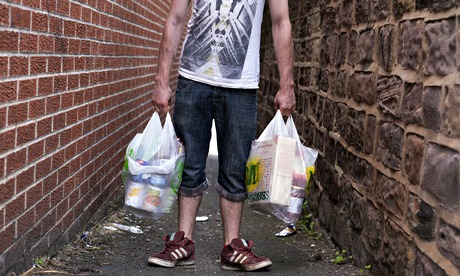As a bishop, I believe it is the duty of religion to challenge political power when it fails in its responsibility to the most vulnerable in society

Food banks: 'Everywhere I go it seems like another one is opening or extending.' Photograph: David Sillitoe for the Guardian
'Religion and politics don't mix," a correspondent tersely informed me, responding to the "bishops' letter"
which 27 of us sent to the Daily Mirror last month to criticise the
government's welfare reforms. I almost agree. To suggest they can be
mixed, like chemicals in a flask, implies that each could exist in a
pure form, separate from the other. I don't believe that. No practical
politics can exist which does not engage with the deepest beliefs of the
people it seeks to serve. No coherent religion can avoid taking a view
on how the community can best order its affairs.
In the 21st century, as secularisation theory heads towards ectoplasm and phlogiston in science's history books, faith and politics together provide a single but multifaceted lens through which we see, and see to act.
As a Church of England bishop, I'm fully signed up to the "five marks of mission" of the worldwide Anglican communion. Meeting human need, sustaining the earth and combatting injustice are at the core of what our faith is about. They sit happily alongside sharing God's good news and growing mature Christian communities. If sometimes our efforts appear to be taking us in the opposite direction then, as every politician knows, it doesn't negate the intention.
Meeting immediate and visible need is faith's most common starting point. In my vicar years, working among young adults with no hope of a job led me to help set up a training programme. One group of participants built their own homes. In Manchester I'm proud to be getting to know groups motivated by faith who are assisting destitute asylum seekers or caring for late-night clubbers who've had one too many. And then of course there are the food banks. Everywhere I go it seems like another one is opening or extending. As the Defra research finally published a few days ago makes clear, it is demand for food handouts that is driving supply, not the other way round. People of faith come together, and join with others, to respond effectively to need. It's already political. In a phrase we are hearing rather less of than three years back, it's the "big society".
Voluntary and faith-based organisations have a proper role in spotting the gaps in society's safety net and responding. The flexibility of the sector and its relatively low levels of regulation make it well placed to quickly meet needs that would be hard to write into a comprehensive welfare structure.
Read more...
In the 21st century, as secularisation theory heads towards ectoplasm and phlogiston in science's history books, faith and politics together provide a single but multifaceted lens through which we see, and see to act.
As a Church of England bishop, I'm fully signed up to the "five marks of mission" of the worldwide Anglican communion. Meeting human need, sustaining the earth and combatting injustice are at the core of what our faith is about. They sit happily alongside sharing God's good news and growing mature Christian communities. If sometimes our efforts appear to be taking us in the opposite direction then, as every politician knows, it doesn't negate the intention.
Meeting immediate and visible need is faith's most common starting point. In my vicar years, working among young adults with no hope of a job led me to help set up a training programme. One group of participants built their own homes. In Manchester I'm proud to be getting to know groups motivated by faith who are assisting destitute asylum seekers or caring for late-night clubbers who've had one too many. And then of course there are the food banks. Everywhere I go it seems like another one is opening or extending. As the Defra research finally published a few days ago makes clear, it is demand for food handouts that is driving supply, not the other way round. People of faith come together, and join with others, to respond effectively to need. It's already political. In a phrase we are hearing rather less of than three years back, it's the "big society".
Voluntary and faith-based organisations have a proper role in spotting the gaps in society's safety net and responding. The flexibility of the sector and its relatively low levels of regulation make it well placed to quickly meet needs that would be hard to write into a comprehensive welfare structure.
Read more...